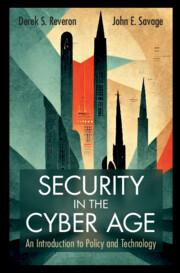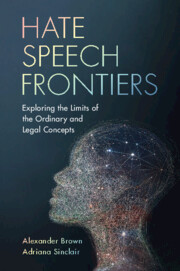Refine search
Actions for selected content:
2860 results in Computing and Society
Part II - The Legal Concept
-
- Book:
- Hate Speech Frontiers
- Published online:
- 26 October 2023
- Print publication:
- 09 November 2023, pp 327-505
-
- Chapter
- Export citation
Acknowledgements
-
- Book:
- Hate Speech Frontiers
- Published online:
- 26 October 2023
- Print publication:
- 09 November 2023, pp viii-viii
-
- Chapter
- Export citation
7 - Denialist Speech
- from Part II - The Legal Concept
-
- Book:
- Hate Speech Frontiers
- Published online:
- 26 October 2023
- Print publication:
- 09 November 2023, pp 399-486
-
- Chapter
- Export citation
6 - Between Hate Speech and Hate Crime
- from Part II - The Legal Concept
-
- Book:
- Hate Speech Frontiers
- Published online:
- 26 October 2023
- Print publication:
- 09 November 2023, pp 363-398
-
- Chapter
- Export citation
Index
-
- Book:
- Hate Speech Frontiers
- Published online:
- 26 October 2023
- Print publication:
- 09 November 2023, pp 593-600
-
- Chapter
- Export citation
Copyright page
-
- Book:
- Hate Speech Frontiers
- Published online:
- 26 October 2023
- Print publication:
- 09 November 2023, pp iv-iv
-
- Chapter
- Export citation
1 - Conceptual Frontiers in the Understanding of Hate Speech
-
- Book:
- Hate Speech Frontiers
- Published online:
- 26 October 2023
- Print publication:
- 09 November 2023, pp 1-44
-
- Chapter
-
- You have access
- HTML
- Export citation
2 - Prototypical Examples of Hate Speech
- from Part I - The Ordinary Concept
-
- Book:
- Hate Speech Frontiers
- Published online:
- 26 October 2023
- Print publication:
- 09 November 2023, pp 47-87
-
- Chapter
- Export citation
5 - Orienting the Ordinary and Legal Concepts of Hate Speech
- from Part II - The Legal Concept
-
- Book:
- Hate Speech Frontiers
- Published online:
- 26 October 2023
- Print publication:
- 09 November 2023, pp 329-362
-
- Chapter
- Export citation
4 - Attacks on the Identities of Groups
- from Part I - The Ordinary Concept
-
- Book:
- Hate Speech Frontiers
- Published online:
- 26 October 2023
- Print publication:
- 09 November 2023, pp 209-326
-
- Chapter
- Export citation
Dedication
-
- Book:
- Hate Speech Frontiers
- Published online:
- 26 October 2023
- Print publication:
- 09 November 2023, pp v-vi
-
- Chapter
- Export citation
Part I - The Ordinary Concept
-
- Book:
- Hate Speech Frontiers
- Published online:
- 26 October 2023
- Print publication:
- 09 November 2023, pp 45-326
-
- Chapter
- Export citation
Contents
-
- Book:
- Hate Speech Frontiers
- Published online:
- 26 October 2023
- Print publication:
- 09 November 2023, pp vii-vii
-
- Chapter
- Export citation

Security in the Cyber Age
- An Introduction to Policy and Technology
-
- Published online:
- 02 November 2023
- Print publication:
- 16 November 2023

Hate Speech Frontiers
- Exploring the Limits of the Ordinary and Legal Concepts
-
- Published online:
- 26 October 2023
- Print publication:
- 09 November 2023
Preface
-
- Book:
- Computing the Climate
- Published online:
- 10 August 2023
- Print publication:
- 24 August 2023, pp vii-viii
-
- Chapter
- Export citation
Index
-
- Book:
- Computing the Climate
- Published online:
- 10 August 2023
- Print publication:
- 24 August 2023, pp 328-335
-
- Chapter
- Export citation
5 - The Heart of the Machine
-
- Book:
- Computing the Climate
- Published online:
- 10 August 2023
- Print publication:
- 24 August 2023, pp 121-157
-
- Chapter
- Export citation
1 - Introduction
-
- Book:
- Computing the Climate
- Published online:
- 10 August 2023
- Print publication:
- 24 August 2023, pp 1-20
-
- Chapter
-
- You have access
- HTML
- Export citation
4 - Taming Chaos
-
- Book:
- Computing the Climate
- Published online:
- 10 August 2023
- Print publication:
- 24 August 2023, pp 90-120
-
- Chapter
- Export citation
